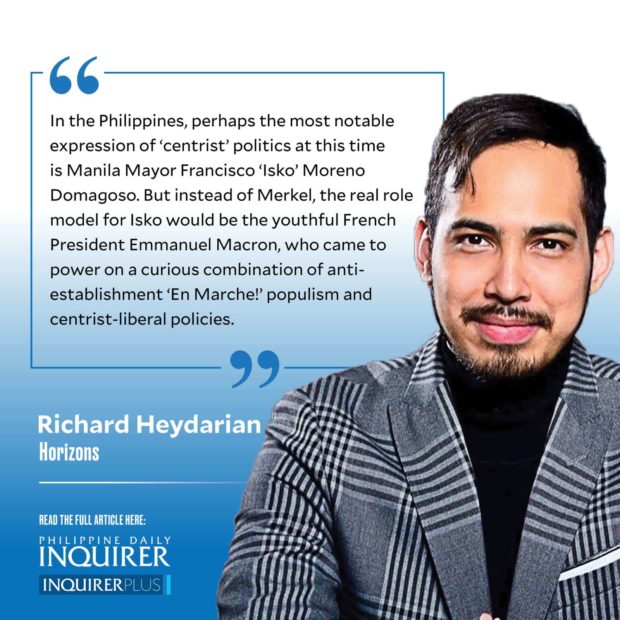Isko Moreno: The ‘Macron of Asia’?
British Prime Minister Margaret Thatcher once warned, “Standing in the middle of the road is very dangerous; you get knocked down by the traffic from both sides.” True to her word, for more than a decade the “Iron Lady” hewed to her stern right-wing side of the road and bulldozed her way through labor unions, state-owned enterprises, and any trace of social democratic politics in Great Britain.
But while Thatcher’s “conviction politics” left its mark on history, it also devastated the manufacturing base and social foundations of British society. And her signature foreign policy decisions would come under criticism over time—from her unconscionable pathos for South Africa’s apartheid regime, to sleepwalking into the Falklands War with Argentina, to secretly negotiating Hong Kong’s handover to Chinese communists.
The most admired leader of our era, the outgoing German chancellor Angela Merkel, represents the polar opposite of Thatcherite politics in her compassionate and wily centrism. Unlike the fiery Thatcher, Merkel admits that she has “no charisma” and is “not good at communicating.” Merkel’s success, as biographer Kati Marton points out in her new book “The Chancellor,” is anchored on her realpolitik machinations, uncanny ability to synthesize seemingly contradictory policy positions, facilitate compromise among competing parties, and stand as a symbol of compassionate strength for the German people.
In the Philippines, perhaps the most notable expression of “centrist” politics at this time is Manila Mayor Francisco “Isko” Moreno Domagoso. But instead of Merkel, the real role model for Isko would be the youthful French President Emmanuel Macron, who came to power on a curious combination of anti-establishment “En Marche!” populism and centrist-liberal policies.
The media-savvy Macron is not only the incumbent French head of state; he also represents, to use Carl Jung’s terminology, a new archetype in democratic politics. In many ways, Macron centrism is a Hegelian reaction to both the deficiencies of standard liberal politics and the perils of authoritarian populism.
A former Socialist Party member and a relatively obscure minister during the François Hollande presidency, Macron rose to fame by bringing a fresh twist to French politics. Though embedded in the establishment, he successfully positioned himself as a proactive, radically independent, and technocratically oriented liberal determined to overhaul the country’s ossified state institutions.
In the 2017 elections, Macron emerged as the de facto candidate of the centrist-liberal majority amid the disintegration of the campaign of corruption-tainted conservative leader François Fillon as well as widespread fears of Trumpian populism under a Marine Le Pen presidency.
Thus, even if barely a quarter (24.01 percent) of voters had Macron as their first choice, the youthful former minister eventually emerged as the decisive winner of French politics in 2017. His La République en Marche! (Republic on the Move!) party, a loose assembly of idealistic professors and professionals, pulled off a landslide victory in legislative elections not long after. Promising a new era, the Macron administration managed to attract young technocrats such as Shahin Vallee and Ismaël Emelien.
The enfant terrible of French politics would lose much of his initial luster in the succeeding years, thanks to a series of scandals, his flirtation with right-wing populism, and unpopular neoliberal reforms.
The parallels with Isko’s rise to power and his centrist gambit are unmistakable. Operating within a far more personalistic and patronage-driven political environment, Isko has gone from a potential candidate of a “united opposition” to now increasingly the de facto candidate of the administration within a matter of two months.
Isko’s campaign is a curious intersection of former administration stalwarts including Lito Banayo and Vince Dizon, as well as the progressive Aksyon Demokratiko Party and liberal opposition figure Samira Gutoc. In terms of policy, from the drug war to the West Philippine Sea, Isko is positioning himself as both a candidate of change and continuity.
Projecting himself as a “healing president,” the Manila mayor is promising to shun ideologically polarizing issues, build on supposed gains in recent years, and mitigate the policy disasters under President Duterte. It’s still unclear whether Isko would prove Thatcher wrong on the perils of centrist politics, especially in our highly polarized political environment. But never underestimate the public yearning for an Asian Macron.
rheydarian@inquirer.com.ph





















